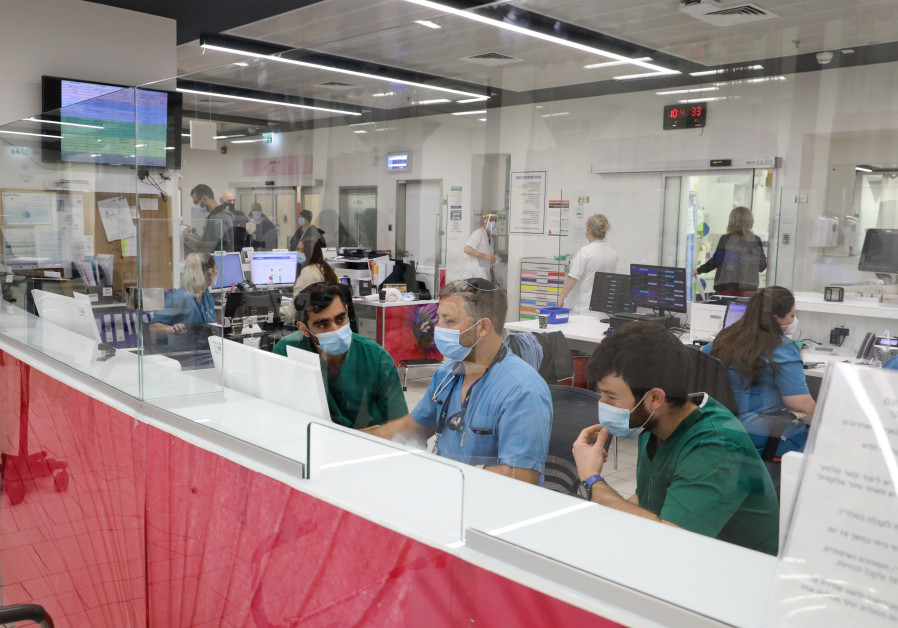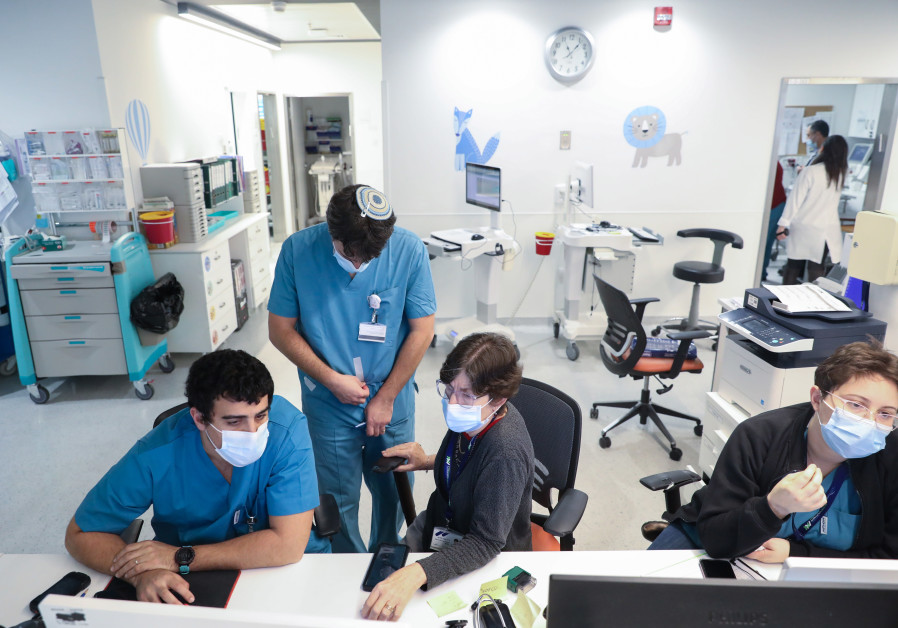When it comes to trauma care, time can be the difference between life and death. Three years ago, for the city of Ashdod, time was the silent killer. Israel’s fifth largest city, with 250,000 residents, lacked a hospital and they were forced to drive a minimum of 30 minutes to the nearest location to receive emergency care. Sometimes people did not make it. “We have saved real lives, just because we are in the area,” said Itay Zoarets, director of trauma services for Samson Assuta Ashdod University Hospital, which opened three years ago – the first new public hospital to be built in the State of Israel in 40 years. In just three years, the numbers speak for themselves: 240,268 emergency department visits, 15,000 births, 7.6 million lab tests and the list goes on. But behind the numbers are people, many of whose lives have been improved or even saved because of Assuta Ashdod.  “Six months ago, I was invited to a feast of thanks for a 22-year-old haredi [ultra-Orthodox] man,” Zoarets recalled. “He had fallen from a fifth floor and was in a profoundly serious situation. He was intubated for a month and had so many surgeries.”Eventually, the hospital managed to stabilize the young man and he came to. He then underwent three months of rehabilitation at Sheba Medical Center, Tel Hashomer. Today, he is walking again.“When you see him, his wife, his friends, the rosh yeshiva – the full circle – you understand what you did,” Zoarets said. There was also the young woman who was run over by a truck and underwent immediate emergency surgery. She had inflammation in her head. “We were really worried,” the doctor recalled. “Her husband just recently sent a video of her laughing with her daughter. She started to teach her again. I started to cry because something like this – there are just so many crazy events.”There was also the 17-year-old who was stabbed in the chest. Zoarets clamped his heart with his own two fingers to stop the bleeding while wheeling him into the trauma room. “If he had to make even a 20-minute drive, he would have died for sure,” the doctor said. “He was almost dead and now he is heading to the army… I earned my job that day.”ASSUTA ASHDOD is located on the Mediterranean coast of Israel, halfway between Tel Aviv and Gaza. Before coronavirus, the city was a tourist magnet with its sailboats and yellow sand dunes – at least during peaceful times, when there were not too many rockets.
“Six months ago, I was invited to a feast of thanks for a 22-year-old haredi [ultra-Orthodox] man,” Zoarets recalled. “He had fallen from a fifth floor and was in a profoundly serious situation. He was intubated for a month and had so many surgeries.”Eventually, the hospital managed to stabilize the young man and he came to. He then underwent three months of rehabilitation at Sheba Medical Center, Tel Hashomer. Today, he is walking again.“When you see him, his wife, his friends, the rosh yeshiva – the full circle – you understand what you did,” Zoarets said. There was also the young woman who was run over by a truck and underwent immediate emergency surgery. She had inflammation in her head. “We were really worried,” the doctor recalled. “Her husband just recently sent a video of her laughing with her daughter. She started to teach her again. I started to cry because something like this – there are just so many crazy events.”There was also the 17-year-old who was stabbed in the chest. Zoarets clamped his heart with his own two fingers to stop the bleeding while wheeling him into the trauma room. “If he had to make even a 20-minute drive, he would have died for sure,” the doctor said. “He was almost dead and now he is heading to the army… I earned my job that day.”ASSUTA ASHDOD is located on the Mediterranean coast of Israel, halfway between Tel Aviv and Gaza. Before coronavirus, the city was a tourist magnet with its sailboats and yellow sand dunes – at least during peaceful times, when there were not too many rockets.
• Eyal Ben-Assa, director of Structural Heart Disease Services, brought transcatheter aortic valve replacement (TAVR) to the region, a service that Ashdod residents used to have from beginning to end only outside of their hometown. Ben-Assa said that from mid-September to December he has treated 30 patients for aortic stenosis, a narrowing of the aortic valve opening that restricts the blood flow from the left ventricle to the aorta and has a low survival rate – as low as 50% at two years and 20% at five years if left untreated. TAVR reduces mortality and also improves quality of life, Ben-Assa said. “Many of these patients [who receive TAVR] are elderly, above 75,” he explained, making open-heart surgery risky. TAVR involves only local anesthesia and patients can go home within two days.
“It’s a game changer, for sure,” he said.The actual procedure is still being conducted outside the hospital, but everything before and after the procedure can now be managed within Assuta Ashdod.• Eli Sapir, chairman of Radiation Oncology, explained that the hospital’s department is the only one like it for tens of kilometers. “Let us assume a patient has breast cancer. She would drive to Sheba or Rabin Medical Center or Hadassah-University Medical Center every day for three to five weeks. If the patient has lung cancer, he will make the drive for six weeks. If he has neck cancer, for seven weeks – stuck in traffic on a daily basis,” Sapir described. “Can you imagine a patient with cancer who has symptoms related to the disease and the treatment doing that? To be stuck in traffic for hours in each direction and suffer from all of these issues is not an easy task.”Ben-Assa said that he is glad he came to work at Assuta Ashdod because the personnel are “young and ambitious,” and the facilities and treatments are “advanced and cutting-edge.” He also said the management is flexible.Before coming to Assuta Ashdod, Ben-Assa worked for Tel Aviv University Sourasky Medical Center.Zoarets, too, said that he jumped on the bandwagon, from Sheba Medical Center, because he was “interested in building something from nothing. I find it challenging but fun to be a part of the first hospital that started in 40 years, to be a part of something bigger than myself.”He said that the staff, like the people who live in the city, is diverse. His team includes doctors from Australia, Brazil, Canada, America and more. At first, it was difficult to communicate. Now, he said, after three years, they speak a joint language.“We support each other and trust each other. We can communicate with just our eyes,” Zoarets said.  Maccabi’s Saar said that the hospital has set three goals: to ensure that patients are never treated in the hallways, to put a stress on interoperability and building a connection between the hospital and the community, and to run financially strong and stable. He believes that in the first three years, the hospital accomplished 70% out of 100% – and in his perspective, that is a solid percentage. ASHER BITON would likely agree. He was seriously injured in September while picking up baked goods to deliver to the needy when Gaza terrorists lobbed a rocket at the city, striking him with shrapnel. The father of 15 was hit just as Prime Minister Benjamin Netanyahu was signing peace deals with the United Arab Emirates and Bahrain at the White House in Washington.Biton took such a heavy hit that the shrapnel pierced his spleen and other vital organs and he suffered from internal bleeding that caused him to quickly lose consciousness. In addition, he lost the bone in his left arm between his elbow and hand.The journey from the incident to the hospital was four minutes by ambulance. Doctors said that 15 or 20 minutes more he would have lost so much blood he would have died for sure, as happened to Irit Sheetrit, a 39-year-old who was killed in a rocket attack in 2008. Although she managed to get out of her car and take cover on the ground, she was wounded critically and succumbed to her injuries.“We brought him here and the doctors said they would not let him die, that they would not let the angel of death take him from me,” Biton’s wife Rivka said in tears. “This whole hospital was built to save my husband.” “Assuta Ashdod is not a luxury,” Biton continued. “We are just one simple family, but I know so many other people – neighbors, friends – who feel the same way.”Over Hanukkah, the Bitons came to the hospital to light candles with Zoarets, who saved Asher, and the rest of the staff. “Those events are what give us strength to keep going,” Zoarets said, adding that he believes that after three years the entire staff can already look back and say, “Wow, look at what we built here. It’s incredible.”Added Saar: “It’s a great hospital, great culture; there is something different being built in Ashdod and I think in the long run it has the potential to change the way we deliver medicine in hospitals across Israel.”
Maccabi’s Saar said that the hospital has set three goals: to ensure that patients are never treated in the hallways, to put a stress on interoperability and building a connection between the hospital and the community, and to run financially strong and stable. He believes that in the first three years, the hospital accomplished 70% out of 100% – and in his perspective, that is a solid percentage. ASHER BITON would likely agree. He was seriously injured in September while picking up baked goods to deliver to the needy when Gaza terrorists lobbed a rocket at the city, striking him with shrapnel. The father of 15 was hit just as Prime Minister Benjamin Netanyahu was signing peace deals with the United Arab Emirates and Bahrain at the White House in Washington.Biton took such a heavy hit that the shrapnel pierced his spleen and other vital organs and he suffered from internal bleeding that caused him to quickly lose consciousness. In addition, he lost the bone in his left arm between his elbow and hand.The journey from the incident to the hospital was four minutes by ambulance. Doctors said that 15 or 20 minutes more he would have lost so much blood he would have died for sure, as happened to Irit Sheetrit, a 39-year-old who was killed in a rocket attack in 2008. Although she managed to get out of her car and take cover on the ground, she was wounded critically and succumbed to her injuries.“We brought him here and the doctors said they would not let him die, that they would not let the angel of death take him from me,” Biton’s wife Rivka said in tears. “This whole hospital was built to save my husband.” “Assuta Ashdod is not a luxury,” Biton continued. “We are just one simple family, but I know so many other people – neighbors, friends – who feel the same way.”Over Hanukkah, the Bitons came to the hospital to light candles with Zoarets, who saved Asher, and the rest of the staff. “Those events are what give us strength to keep going,” Zoarets said, adding that he believes that after three years the entire staff can already look back and say, “Wow, look at what we built here. It’s incredible.”Added Saar: “It’s a great hospital, great culture; there is something different being built in Ashdod and I think in the long run it has the potential to change the way we deliver medicine in hospitals across Israel.”



